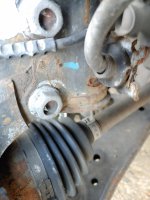I've just been contributing to Baglady's leaky gear selector thread (500) and it's made me think about "stiff, solid, sticky" - call it what you like - antiseize/corrosion protection coating.
I had a quick recce under Becky's rear end last night in preparation for all the "stuff" - brakes and rear axle corrosion - I'll soon be tackling. Considering the brakes, I think I'm going to just take the flexes off both sides and renew them and pipes and cylinders etc so the hydraulics will be new from the flexes back, flexes included. Mainly I've decided on this because the metal pipes front to rear, and their tube nuts where they go into the flexes, look not too bad but the tube nuts coming out of the flexes and the tube nuts on the cylinders are pretty crusty as is the pipework around them. So I'm hoping the front to rear pipe tube nuts will unscrew from the flexes - might have to wind the flexes off the nuts though? On reassembly the new pipes will be Kunifer but the front to rear pipes and their tube nuts will be original. Historically I'd have slaistered some Copaslip around the tube nuts and original pipe work but Copper based antiseize has somewhat fallen from favour of late and I was just wondering what you guys/girls would use for this?
Also, If the rear most of the two brake cylinder nuts refuse to undo with an open ender, (we're talking about a 2010 169 here so you can't get a ring key or socket on the head of that rearmost bolt) what do you recommend. I see the "official" recommendation is to undo the Allen screws which hold the back plate to the hub so you can then get a small socket on it, but I'm worried in case they - the Allen screws holding the back plate to the hub - shear. My friendly wee local indy (Harrisons) says that's sensible and what they do is put a cutting disc in an angle grinder and carefully cut away the casting around the rear bolt to leave one side of it exposed which, if you don't damage the threads will usually then unscrew. It also has the advantage that you can apply heat and releasing oil directly to the exposed threads if you need to. So, opinions please, what would you do?
I had a quick recce under Becky's rear end last night in preparation for all the "stuff" - brakes and rear axle corrosion - I'll soon be tackling. Considering the brakes, I think I'm going to just take the flexes off both sides and renew them and pipes and cylinders etc so the hydraulics will be new from the flexes back, flexes included. Mainly I've decided on this because the metal pipes front to rear, and their tube nuts where they go into the flexes, look not too bad but the tube nuts coming out of the flexes and the tube nuts on the cylinders are pretty crusty as is the pipework around them. So I'm hoping the front to rear pipe tube nuts will unscrew from the flexes - might have to wind the flexes off the nuts though? On reassembly the new pipes will be Kunifer but the front to rear pipes and their tube nuts will be original. Historically I'd have slaistered some Copaslip around the tube nuts and original pipe work but Copper based antiseize has somewhat fallen from favour of late and I was just wondering what you guys/girls would use for this?
Also, If the rear most of the two brake cylinder nuts refuse to undo with an open ender, (we're talking about a 2010 169 here so you can't get a ring key or socket on the head of that rearmost bolt) what do you recommend. I see the "official" recommendation is to undo the Allen screws which hold the back plate to the hub so you can then get a small socket on it, but I'm worried in case they - the Allen screws holding the back plate to the hub - shear. My friendly wee local indy (Harrisons) says that's sensible and what they do is put a cutting disc in an angle grinder and carefully cut away the casting around the rear bolt to leave one side of it exposed which, if you don't damage the threads will usually then unscrew. It also has the advantage that you can apply heat and releasing oil directly to the exposed threads if you need to. So, opinions please, what would you do?


